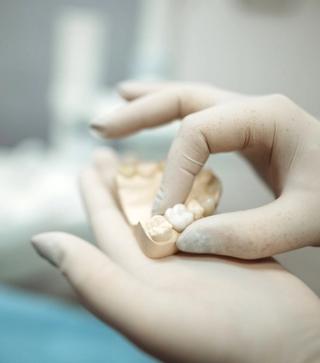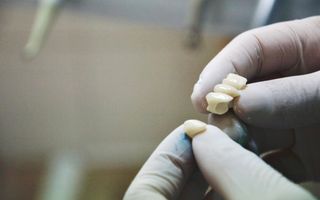
A dental crown is a thin, custom-made cover that snugly encases your existing tooth, adding strength, protecting your natural tooth, and enhancing its appearance. At National Dental Care Darwin, we are passionate about providing quality dental crown services tailored to your dental needs.
With years of combined experience, our team at National Dental Care Darwin is dedicated to providing quality dental crown treatments. If you're considering enhancing your smile with dental crown treatments, schedule a consultation with our team.
What is a dental crown?
A dental crown acts as a thin, custom-made shell that fits snugly over your original tooth. You’ll barely feel the difference, while the crown’s natural appearance means it’s almost impossible to tell you have one.
Dental crowns are a great way to repair a compromised or damaged tooth, and have many oral health benefits. In fact, a crown can make the difference between preserving a natural tooth and having it extracted.

A dental crown may be needed when a natural tooth is weakened, broken or damaged. For instance, many people who have a root canal treatment opt for a dental crown to strengthen the tooth.
Dental crowns are usually made from porcelain, a robust material that can be seamlessly matched to the colour of your natural teeth. Alternatively, gold crowns can be used for increased durability, but they may not blend as naturally. Gold crowns are typically used for back teeth, as they are less visible but take more of the chewing force.
Dental crowns can also be used to enhance the appearance of teeth that are stained or misshaped. In cases of tooth discolouration, a dental crown can be placed over the original tooth to whiten your smile, especially when traditional teeth whitening methods aren’t effective.

The advantages of a dental crown
A crown is an excellent solution to a number of problems, and offers a variety of advantages.
- Protect a weak or damaged tooth: The key advantage of a dental crown is that it strengthens your tooth, avoiding further damage or issues that could arise due to a weakened tooth.
- Improved appearance: Dental crowns can cover misshapen or discoloured teeth for a brighter, whiter smile.
- Long lasting: With the right care, a dental crown is a long-lasting solution that you can forget about after you get it.
What to expect from a dental crown appointment
Here’s what to expect from start to finish when you get a dental crown at NDC Darwin:
- Have something to eat and drink before your appointment
- Brush and floss your teeth
- Your dentist will apply a local anaesthetic to numb the area
- They will remove a thin layer from your tooth and shape the tooth
- They may take a scan or a mould of your tooth.
- They will attach a temporary crown and shape it to your bite
- The whole procedure may be a little uncomfortable but not painful
- Raise your hand any time you need a break
- The area may be numb for a few hours following the procedure
- The area may be tender for a day or two after the procedure
- During the second appointment, your dentist will remove the temporary crown
- They will put the permanent crown on to check the fit is correct
- They will then attach the permanent dental crown with dental cement
- They will shape the crown to your bite
Making dental crowns affordable
Health Funds
At National Dental Care Darwin, we accept all major health fund providers. Plus, our HICAPS facilities allow you to claim your rebate on the spot after your treatment – there’s no waiting around.
We are also a preferred provider for many health funds - so if you’re with one of our preferred provider funds, you can use your dental extras to minimise out-of-pocket expenses.
We're here to help you make the most of your dental benefits.

Payment Plans
Our payment plans, SmileFund and Afterpay, provide a flexible, interest-free payment option, ensuring you receive the care you need without worrying about the cost.
SmileFund is our exclusive payment plan that provides interest-free payments for unexpected or unplanned treatments for up to 18-months.
Seeking both aesthetics and functionality for your teeth? Consider improving your smile with our professional dental crown services at National Dental Care Darwin.
Get in touch with our friendly team today.
Frequently asked questions
Not all teeth that receive a dental crown require a root canal procedure. Root canal treatment is typically necessary when the tooth has extensive decay or infection that has reached the pulp, causing pain or abscess.
During your initial examination at National Dental Care Darwin, our experienced dentists will evaluate the condition of your tooth and recommend the best treatment, whether it involves a root canal or not.
The cost of a dental crown will vary depending on which tooth or teeth are involved. During your initial consultation at National Dental Care Darwin, our experienced dental professionals will evaluate your specific needs and provide you with a personalised treatment plan along with an accurate cost estimate.
No, receiving a dental crown is typically painless, as your dentist will apply a local anaesthetic to numb the treated area. While you may experience some discomfort from keeping your mouth open during the procedure, you can always request a break if needed.
Rest assured our caring team of professionals at National Dental Care Darwin are here to keep you comfortable throughout the entire treatment.
Crowns are usually suitable for teeth that have been heavily restored with previous fillings, or for teeth that have severe decay. The most common reason a crown fails is not the crown itself, but the tooth underneath.
If the crown does fail, you can often have it replaced. There is no set time to replace crowns - and with good oral hygiene and regular check-ups, a crown can typically last for many years.
